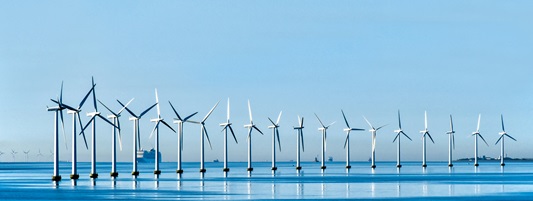Contact us
Send a messageOverview
Oceans are a source of abundant renewable energy potential, capable of driving a blue economy. Energy harnessed from oceans, through offshore renewables, can contribute to the decarbonisation of the power sector and other end user applications relevant for a blue economy (e.g. shipping, cooling, water desalination). Offshore renewables can also provide significant socio-economic opportunities to countries with coastal areas and island territories, such as jobs creation, improved livelihoods, local value chains and enhanced synergies between blue economy actors.
The Collaborative Framework on Ocean Energy/Offshore Renewables serves as an effective vehicle for dialogue, co-operation and coordinated action to accelerate the uptake of offshore renewables in benefit of the global renewable energy transformation. The technology scope includes:
- Offshore and floating wind technology;
- Wave, tidal, ocean thermal conversion and salinity gradient technologies; and
- Floating PV.
The scope of the Collaborative Framework will be addressed in the form of workstreams aiming to:
- Provide a global platform for enhanced international cooperation to accelerate the deployment of offshore renewables worldwide;
- Create a community of country and industry experts, to facilitate the exchange of knowledge and best practices in supporting Offshore Renewables Markets;
- Undertake analytical reviews of selected thematic in support to integrate offshore renewables in action agendas for the energy sector in global initiatives such as the G20 and the UNFCCC COP;
- Foster enabling policy, regulatory, technology and financial frameworks for increased deployment of offshore renewables towards the transformative decarbonisation of societies.
In previous meetings, Members discussed on the priority areas of the Collaborative Framework which include: policy frameworks, innovation, ocean energy resource assessment and regional collaboration for offshore renewables deployment.
Members elected Tonga and Italy as co-facilitators.
Related news:
Related Events
More eventsModalities
-
Participation
- Meetings of the Collaborative Framework will be open-ended to all IRENA Members and States in Accession. Members of the private sector, associations, research communities, International Governmental Organisations and Non-governmental Organisations, among others, involved in this thematic area of work will also be invited to participate.
- Facilitators/Co-facilitators
- The Facilitator/Co-Facilitators will be selected from the Membership, will coordinate the deliberations of the Collaborative Framework and may serve for a period of one year with the possibility of a one-year extension.
- A proposal to designate the Kingdom of Tonga and Italy as Co-Facilitators of the Collaborative Framework on Ocean Energy/Offshore Renewables was put forward and supported by several Members. The Kingdom of Tonga and Italy accepted their designation as Co-Facilitators for an initial period of one year, starting in 2021.
- Internal working groups
- The Collaborative Framework may, as needed, form a group(s) of core members to support in-depth discussions on specific topics of interest.
- Should a number of Members share an interest in a particular topic, they can submit a request to the IRENA Secretariat. The request will then be brought into the Collaborative Framework for the Members to decide whether to proceed with it. Should the request go forward, participation in the working group would be possible for all interested Members. Members also noted that the number of working groups should be limited, as capacities and resources are already limited.
- Reporting
- The Facilitator/Co-Facilitators will normally report to one IRENA Council per year, or more as may be necessary, to inform the Membership on advances made with its workplan. Such reports may focus on experience and best practices identified, recommendations on specific thematic areas of work, areas of research, technical reports, etc.
- High-Level meetings
- Ministerial/High-Level meetings of the Collaborative Framework may be held, as necessary, in the context of the work of the Assembly, annually preceding or post-Assembly, as mandated by - and in the context of - the work of the Assembly.




